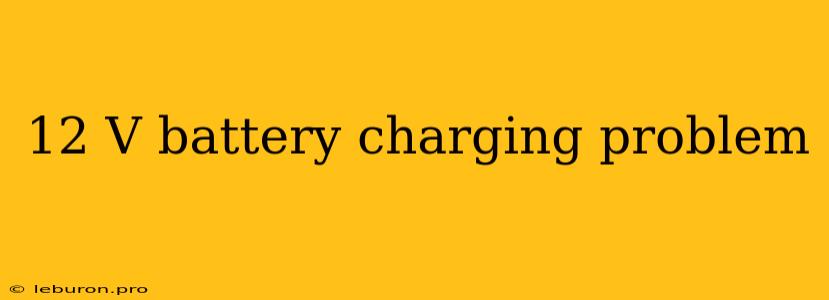A 12V battery is a common power source for a wide range of applications, from car batteries to motorcycle batteries to even some power tools. When your 12V battery fails to charge, it can be a frustrating and inconvenient experience. This can be due to a multitude of factors, ranging from simple issues like a loose connection to more complex problems like a faulty charging system. This article will delve into the common causes of 12V battery charging problems, explain how to diagnose the issue, and offer solutions to get your battery back to a fully charged state.
Common Causes of 12V Battery Charging Problems
A variety of issues can prevent a 12V battery from charging correctly. Identifying the root cause is key to addressing the problem effectively. Here are some of the most frequent culprits:
1. Faulty Battery
The first thing to suspect is the battery itself. Over time, batteries degrade, and their ability to hold a charge can diminish. If the battery is old or has been subjected to excessive heat or cold, it may be unable to accept a charge. A simple test with a multimeter can confirm whether the battery has enough voltage and is capable of holding a charge.
2. Loose or Corroded Connections
Loose or corroded connections between the battery terminals and the charging system can hinder the flow of electricity, preventing the battery from charging. Check the battery terminals for any signs of corrosion and ensure that the connections are tight and secure. Clean any corrosion with a wire brush and battery terminal cleaner.
3. Faulty Alternator
The alternator is responsible for generating electrical power while the engine is running and charging the battery. A faulty alternator can result in insufficient charging current reaching the battery. You can test the alternator output using a voltmeter to see if it's producing the required voltage. If the output is below the specified range, you may need to replace the alternator.
4. Damaged Charging Cables
Damaged or faulty charging cables can also interrupt the charging process. Inspect the cables for any cuts, breaks, or fraying. Replace any damaged cables immediately to ensure proper current flow.
5. Faulty Battery Charger
If you are using an external charger, it's crucial to ensure that the charger is functioning correctly. Check the charger for any signs of damage or malfunction. Use a different charger if possible to rule out the charger as the issue.
6. Faulty Voltage Regulator
The voltage regulator controls the output voltage of the alternator, ensuring that it remains within the safe range for the battery. A faulty voltage regulator can result in overcharging or undercharging the battery. Check the voltage regulator for any signs of damage or overheating.
7. Faulty Battery Sensor
Some vehicles have a battery sensor that monitors the battery's state of charge. A faulty battery sensor can lead to inaccurate readings and hinder the charging process. If you suspect a faulty sensor, it's best to consult a mechanic.
Diagnosing 12V Battery Charging Problems
Diagnosing 12V battery charging problems can be done using a simple voltmeter.
-
Measure the battery voltage: A fully charged 12V battery should have a voltage of approximately 12.6 volts. If the voltage is significantly lower, the battery may be discharged or faulty.
-
Check the alternator output: With the engine running, measure the voltage at the battery terminals. The alternator should be producing around 13.5-14.5 volts. If the voltage is lower, the alternator may be faulty.
-
Inspect the charging cables: Check the cables for any signs of damage or corrosion.
-
Test the charging system: Use a multimeter to measure the current flowing to the battery. This will indicate whether the charging system is delivering sufficient current.
Solutions to 12V Battery Charging Problems
Once you've identified the cause of the charging problem, you can take steps to address it.
1. Replace the Battery
If the battery is old or damaged, replacing it with a new battery is the most effective solution. Choose a battery with the correct specifications for your application.
2. Clean or Replace Connections
Clean any corrosion from the battery terminals and ensure that all connections are tight and secure. If the connections are damaged, they may need to be replaced.
3. Replace the Alternator
If the alternator is faulty, it will need to be replaced. Make sure to purchase a compatible alternator for your vehicle.
4. Repair or Replace Charging Cables
Replace any damaged charging cables. Repair or replace any corroded or damaged connectors.
5. Replace the Battery Charger
If you are using an external charger, try a different charger to rule out the charger as the cause. If the charger is faulty, it may need to be replaced.
6. Replace the Voltage Regulator
If the voltage regulator is faulty, it will need to be replaced. A qualified mechanic can diagnose and replace the voltage regulator.
7. Replace the Battery Sensor
If the battery sensor is faulty, it may need to be replaced. A qualified mechanic can diagnose and replace the sensor.
Preventing 12V Battery Charging Problems
Taking preventative measures can help to extend the life of your 12V battery and prevent charging problems:
- Regularly check the battery terminals for corrosion and clean them if necessary.
- Use a battery tender to maintain a full charge when the battery is not in use.
- Avoid leaving electronic devices connected to the battery when the engine is off.
- Have your charging system inspected regularly by a qualified mechanic.
By understanding the common causes of 12V battery charging problems and taking steps to diagnose and address them, you can ensure that your battery stays healthy and your vehicle or device remains operational. Regular maintenance and preventative measures can also help to prolong the life of your battery and avoid costly repairs in the future.
